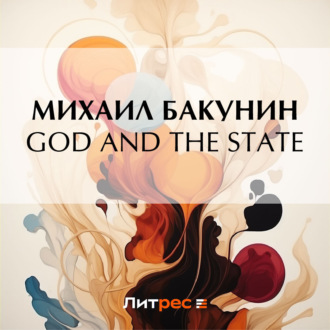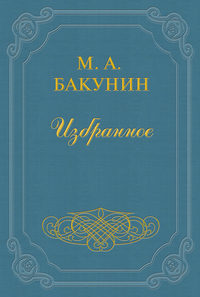 полная версия
полная версияGod and the State
There is a class of people who, if they do not believe, must at least make a semblance of believing. This class, comprising all the tormentors, all the oppressors, and all the exploiters of humanity; priests, monarchs, statesmen, soldiers, public and private financiers, officials of all sorts, policemen, gendarmes, jailers and executioners, monopolists, capitalists, tax-leeches, contractors and landlords, lawyers, economists, politicians of all shades, down to the smallest vendor of sweetmeats, all will repeat in unison those words of Voltaire:
“If God did not exist, it would be necessary to invent him.” For, you understand, “the people must have a religion.” That is the safety-valve.
There exists, finally, a somewhat numerous class of honest but timid souls who, too intelligent to take the Christian dogmas seriously, reject them in detail, but have neither the courage nor the strength nor the necessary resolution to summarily renounce them altogether. They abandon to your criticism all the special absurdities of religion, they turn up their noses at all the miracles, but they cling desperately to the principal absurdity; the source of all the others, to the miracle that explains and justifies all the other miracles, the existence of God. Their God is not the vigorous and powerful being, the brutally positive God of theology. It is a nebulous, diaphanous, illusory being that vanishes into nothing at the first attempt to grasp it; it is a mirage, an ignis fatuus that neither warms nor illuminates. And yet they hold fast to it, and believe that, were it to disappear, all would disappear with it. They are uncertain, sickly souls, who have lost their reckoning in the present civilization, belonging to neither the present nor the future, pale phantoms eternally suspended between heaven and earth, and occupying exactly the same position between the politics of the bourgeois and the Socialism of the proletariat. They have neither the power nor the wish nor the determination to follow out their thought, and they waste their time and pains in constantly endeavoring to reconcile the irreconcilable. In public life these are known as bourgeois Socialists.
With them, or against them, discussion is out of the question. They are too puny.
But there are a few illustrious men of whom no one will dare to speak without respect, and whose vigorous health, strength of mind, and good intention no one will dream of calling in question. I need only cite the names of Mazzini, Michelet, Quinet, John Stuart Mill.2 Generous and strong souls, great hearts, great minds, great writers, and the first the heroic and revolutionary regenerator of a great nation, they are all apostles of idealism and bitter despisers and adversaries of materialism, and consequently of Socialism also, in philosophy as well as in politics.
Against them, then, we must discuss this question.
First, let it be remarked that not one of the illustrious men I have just named nor any other idealistic thinker of any consequence in our day has given any attention to the logical side of this question properly speaking. Not one has tried to settle philosophically the possibility of the divine salto mortale from the pure and eternal regions of spirit into the mire of the material world. Have they feared to approach this irreconcilable contradiction and despaired of solving it after the failures of the greatest geniuses of history, or have they looked upon it as already sufficiently well settled? That is their secret. The fact is that they have neglected the theoretical demonstration of the existence of a God, and have developed only its practical motives and consequences. They have treated it as a fact universally accepted, and, as such, no longer susceptible of any doubt whatever, for sole proof thereof limiting themselves to the establishment of the antiquity and this very universality of the belief in God.
This imposing unanimity, in the eyes of many illustrious men and writers to quote only the most famous of them who eloquently expressed it, Joseph de Maistre and the great Italian patriot, Giuseppe Mazzini – is of more value than all the demonstrations of science; and if the reasoning of a small number of logical and even very powerful, but isolated, thinkers is against it, so much the worse, they say, for these thinkers and their logic, for universal consent, the general and primitive adoption of an idea, has always been considered the most triumphant testimony to its truth. The sentiment of the whole world, a conviction that is found and maintained always and everywhere, cannot be mistaken; it must have its root in a necessity absolutely inherent in the very nature of man. And since it has been established that all peoples, past and present, have believed and still believe in the existence of God, it is clear that those who have the misfortune to doubt it, whatever the logic that led them to this doubt, are abnormal exceptions, monsters.
Thus, then, the antiquity and universality of a belief should be regarded, contrary to all science and all logic, as sufficient and unimpeachable proof of its truth. Why?
Until the days of Copernicus and Galileo everybody believed that the sun revolved about the earth. Was not everybody mistaken? What is more ancient and more universal than slavery? Cannibalism perhaps. From the origin of historic society down to the present day there has been always and everywhere exploitation of the compulsory labor of the masses – slaves, serfs, or wage-workers – by some dominant minority; oppression of the people by the Church and by the State. Must it be concluded that this exploitation and this oppression are necessities absolutely inherent in the very existence of human society? These are examples which show that the argument of the champions of God proves nothing.
Nothing, in fact, is as universal or as ancient as the iniquitous and absurd; truth and justice, on the contrary, are the least universal, the youngest features in the development of human society. In this fact, too, lies the explanation of a constant historical phenomenon – namely, the persecution of which those who first proclaim the truth have been and continue to be the objects at the hands of the official, privileged, and interested representatives of “universal” and “ancient” beliefs, and often also at the hands of the same masses who, after having tortured them, always end by adopting their ideas and rendering them victorious.
To us materialists and Revolutionary Socialists, there is nothing astonishing or terrifying in this historical phenomenon. Strong in our conscience, in our love of truth at all hazards, in that passion for logic which of itself alone constitutes a great power and outside of which there is no thought; strong in our passion for justice and in our unshakable faith in the triumph of humanity over all theoretical and practical bestialities; strong, finally, in the mutual confidence and support given each other by the few who share our convictions – we resign ourselves to all the consequences of this historical phenomenon, in which we see the manifestation of a social law as natural, as necessary, and as invariable as all the other laws which govern the world.
This law is a logical, inevitable consequence of the animal origin of human society; for in face of all the scientific, physiological, psychological, and historical proofs accumulated at the present day, as well as in face of the exploits of the Germans conquering France, which now furnish so striking a demonstration thereof, it is no longer possible to really doubt this origin. But from the moment that this animal origin of man is accepted, all is explained. History then appears to us as the revolutionary negation, now slow, apathetic, sluggish, now passionate and powerful, of the past. It consists precisely in the progressive negation of the primitive animality of man by the development of his humanity. Man, a wild beast, cousin of the gorilla, has emerged from the profound darkness of animal instinct into the light of the mind, which explains in a wholly natural way all his past mistakes and partially consoles us for his present errors. He has gone out from animal slavery, and passing through divine slavery, a temporary condition between his animality and his humanity, he is now marching on to the conquest and realization of human liberty. Whence it results that the antiquity of a belief, of an idea, far from proving anything in its favor, ought, on the contrary, to lead us to suspect it. For behind us is our animality and before us our humanity; human light, the only thing that can warm and enlighten us, the only thing that can emancipate us, give us dignity, freedom, and happiness, and realize fraternity among us, is never at the beginning, but, relatively to the epoch in which we live, always at the end of history. Let us, then, never look back, let us look ever forward; for forward is our sunlight, forward our salvation. If it is justifiable, and even useful and necessary, to turn back to study our past, it is only in order to establish what we have been and what we must no longer be, what we have believed and thought and what we must no longer believe or think, what we have done and what we must do nevermore.
So much for antiquity. As for the universality of an error, it proves but one thing – the similarity, if not the perfect identity, of human nature in all ages and under all skies. And, since it is established that all peoples, at all periods of their life, have believed and still believe in God, we must simply conclude that the divine idea, an outcome of ourselves, is an error historically necessary in the development of humanity, and ask why and how it was produced in history and why an immense majority of the human race still accept it as a truth.
Until we shall account to ourselves for the manner in which the idea of a supernatural or divine world was developed and had to be developed in the historical evolution of the human conscience, all our scientific conviction of its absurdity will be in vain; until then we shall never succeed in destroying it in the opinion of the majority, because we shall never be able to attack it in the very depths of the human being where it had birth. Condemned to a fruitless struggle, without issue and without end, we should for ever have to content ourselves with fighting it solely on the surface, in its innumerable manifestations, whose absurdity will be scarcely beaten down by the blows of common sense before it will reappear in a new form no less nonsensical. While the root of all the absurdities that torment the world, belief in God, remains intact, it will never fail to bring forth new offspring. Thus, at the present time, in certain sections of the highest society, Spiritualism tends to establish itself upon the ruins of Christianity.
It is not only in the interest of the masses, it is in that of the health of our own minds, that we should strive to understand the historic genesis, the succession of causes which developed and produced the idea of God in the consciousness of men. In vain shall we call and believe ourselves Atheists, until we comprehend these causes, for, until then, we shall always suffer ourselves to be more or less governed by the clamors of this universal conscience whose secret we have not discovered; and, considering the natural weakness of even the strongest individual against the all-powerful influence of the social surroundings that trammel him, we are always in danger of relapsing sooner or later, in one way or another, into the abyss of religious absurdity. Examples of these shameful conversions are frequent in society to-day.
I have stated the chief practical reason of the power still exercised to-day over the masses by religious beliefs. These mystical tendencies do not signify in man so much an aberration of mind as a deep discontent at heart. They are the instinctive and passionate protest of the human being against the narrowness, the platitudes, the sorrows, and the shame of a wretched existence. For this malady, I have already said, there is but one remedy – Social Revolution.
In the meantime I have endeavored to show the causes responsible for the birth and historical development of religious hallucinations in the human conscience. Here it is my purpose to treat this question of the existence of a God, or of the divine origin of the world and of man, solely from the standpoint of its moral and social utility, and I shall say only a few words, to better explain my thought, regarding the theoretical grounds of this belief.
All religions, with their gods, their demigods, and their prophets, their messiahs and their saints, were created by the credulous fancy of men who had not attained the full development and full possession of their faculties. Consequently, the religious heaven is nothing but a mirage in which man, exalted by ignorance and faith, discovers his own image, but enlarged and reversed – that is, divinized. The history of religions, of the birth, grandeur, and decline of the gods who have succeeded one another in human belief, is nothing, therefore, but the development of the collective intelligence and conscience of mankind. As fast as they discovered, in the course of their historically progressive advance, either in themselves or in external nature, a power, a quality, or even any great defect whatever, they attributed them to their gods, after having exaggerated and enlarged them beyond measure, after the manner of children, by an act of their religious fancy. Thanks to this modesty and pious generosity of believing and credulous men, heaven has grown rich with the spoils of the earth, and, by a necessary consequence, the richer heaven became, the more wretched became humanity and the earth. God once installed, he was naturally proclaimed the cause, reason, arbiter, and absolute disposer of all things: the world thenceforth was nothing, God was all; and man, his real creator, after having unknowingly extracted him from the void, bowed down before him, worshipped him, and avowed himself his creature and his slave.
Christianity is precisely the religion par excellence, because it exhibits and manifests, to the fullest extent, the very nature and essence of every religious system, which is the impoverishment, enslavement, and annihilation of humanity for the benefit of divinity.
God being everything, the real world and man are nothing. God being truth, justice, goodness, beauty, power, and life, man is falsehood, iniquity, evil, ugliness, impotence, and death. God being master, man is the slave. Incapable of finding justice, truth, and eternal life by his own effort, he can attain them only through a divine revelation. But whoever says revelation says revealers, messiahs, prophets, priests, and legislators inspired by God himself; and these, once recognized as the representatives of divinity on earth, as the holy instructors of humanity, chosen by God himself to direct it in the path of salvation, necessarily exercise absolute power. All men owe them passive and unlimited obedience; for against the divine reason there is no human reason, and against the justice of God no terrestrial justice holds. Slaves of God, men must also be slaves of Church and State, in so far as the State is consecrated by the Church. This truth Christianity, better than all other religions that exist or have existed, understood, not excepting even the old Oriental religions, which included only distinct and privileged nations, while Christianity aspires to embrace entire humanity; and this truth Roman Catholicism, alone among all the Christian sects, has proclaimed and realized with rigorous logic. That is why Christianity is the absolute religion, the final religion; why the Apostolic and Roman Church is the only consistent, legitimate, and divine church.
With all due respect, then, to the metaphysicians and religious idealists, philosophers, politicians, or poets: The idea of God implies the abdication of human reason and justice; it is the most decisive negation of human liberty, and necessarily ends in the enslavement of mankind, both in theory and practice.
Unless, then, we desire the enslavement and degradation of mankind, as the Jesuits desire it, as the mômiers, pietists, or Protestant Methodists desire it, we may not, must not make the slightest concession either to the God of theology or to the God of metaphysics. He who, in this mystical alphabet, begins with A will inevitably end with Z; he who desires to worship God must harbor no childish allusions about the matter, but bravely renounce his liberty and humanity.
If God is, man is a slave; now, man can and must be free; then, God does not exist.
I defy anyone whomsoever to avoid this circle; now, therefore, let all choose.
Is it necessary to point out to what extent and in what manner religions debase and corrupt the people? They destroy their reason, the principal instrument of human emancipation, and reduce them to imbecility, the essential condition of their slavery. They dishonor human labor, and make it a sign and source of servitude. They kill the idea and sentiment of human justice, ever tipping the balance to the side of triumphant knaves, privileged objects of divine indulgence. They kill human pride and dignity, protecting only the cringing and humble. They stifle in the heart of nations every feeling of human fraternity, filling it with divine cruelty instead.
All religions are cruel, all founded on blood; for all rest principally on the idea of sacrifice – that is, on the perpetual immolation of humanity to the insatiable vengeance of divinity. In this bloody mystery man is always the victim, and the priest – a man also, but a man privileged by grace – is the divine executioner. That explains why the priests of all religions, the best, the most humane, the gentlest, almost always have at the bottom of their hearts – and, if not in their hearts, in their imaginations, in their minds (and we know the fearful influence of either on the hearts of men) – something cruel and sanguinary.
None know all this better than our illustrious contemporary idealists. They are learned men, who know history by heart; and, as they are at the same time living men, great souls penetrated with a sincere and profound love for the welfare of humanity, they have cursed and branded all these misdeeds, all these crimes of religion with an eloquence unparalleled. They reject with indignation all solidarity with the God of positive religions and with his representatives, past, present, and on earth.
The God whom they adore, or whom they think they adore, is distinguished from the real gods of history precisely in this – that he is not at all a positive god, defined in any way whatever, theologically or even metaphysically. He is neither the supreme being of Robespierre and J. J. Rousseau, nor the pantheistic god of Spinoza, nor even the at once immanent, transcendental, and very equivocal god of Hegel. They take good care not to give him any positive definition whatever, feeling very strongly that any definition would subject him to the dissolving power of criticism. They will not say whether he is a personal or impersonal god, whether he created or did not create the world; they will not even speak of his divine providence. All that might compromise him. They content themselves with saying “God” and nothing more. But, then, what is their God? Not even an idea; it is an aspiration.
It is the generic name of all that seems grand, good, beautiful, noble, human to them. But why, then, do they not say, “Man.” Ah! because King William of Prussia and Napoleon III. and all their compeers are likewise men: which bothers them very much. Real humanity presents a mixture of all that is most sublime and beautiful with all that is vilest and most monstrous in the world. How do they get over this? Why, they call one divine and the other bestial, representing divinity and animality as two poles, between which they place humanity. They either will not or cannot understand that these three terms are really but one, and that to separate them is to destroy them.
They are not strong on logic, and one might say that they despise it. That is what distinguishes them from the pantheistical and deistical metaphysicians, and gives their ideas the character of a practical idealism, drawing its inspiration much less from the severe development of a thought than from the experiences, I might almost say the emotions, historical and collective as well as individual, of life. This gives their propaganda an appearance of wealth and vital power, but an appearance only; for life itself becomes sterile when paralyzed by a logical contradiction.
This contradiction lies here: they wish God, and they wish humanity. They persist in connecting two terms which, once separated, can come together again only to destroy each other. They say in a single breath: “God and the liberty of man,” “God and the dignity, justice, equality, fraternity, prosperity of men” – regardless of the fatal logic by virtue of which, if God exists, all these things are condemned to non-existence. For, if God is, he is necessarily the eternal, supreme, absolute master, and, if such a master exists, man is a slave; now, if he is a slave, neither justice, nor equality, nor fraternity, nor prosperity are possible for him. In vain, flying in the face of good sense and all the teachings of history, do they represent their God as animated by the tenderest love of human liberty: a master, whoever he may be and however liberal he may desire to show himself, remains none the less always a master. His existence necessarily implies the slavery of all that is beneath him. Therefore, if God existed, only in one way could he serve human liberty – by ceasing to exist.
A jealous lover of human liberty, and deeming it the absolute condition of all that we admire and respect in humanity, I reverse the phrase of Voltaire, and say that, if God really existed, it would be necessary to abolish him.
The severe logic that dictates these words is far too evident to require a development of this argument. And it seems to me impossible that the illustrious men, whose names so celebrated and so justly respected I have cited, should not have been struck by it themselves, and should not have perceived the contradiction in which they involve themselves in speaking of God and human liberty at once. To have disregarded it, they must have considered this inconsistency or logical license practically necessary to humanity’s well-being.
Perhaps, too, while speaking of liberty as something very respectable and very dear in their eyes, they give the term a meaning quite different from the conception entertained by us, materialists and Revolutionary Socialists. Indeed, they never speak of it without immediately adding another word, authority– a word and a thing which we detest with all our heart.
What is authority? Is it the inevitable power of the natural laws which manifest themselves in the necessary concatenation and succession of phenomena in the physical and social worlds? Indeed, against these laws revolt is not only forbidden – it is even impossible. We may misunderstand them or not know them at all, but we cannot disobey them; because they constitute the basis and fundamental conditions of our existence; they envelop us, penetrate us, regulate all our movements, thoughts, and acts; even when we believe that we disobey them, we only show their omnipotence.
Yes, we are absolutely the slaves of these laws. But in such slavery there is no humiliation, or, rather, it is not slavery at all. For slavery supposes an external master, a legislator outside of him whom he commands, while these laws are not outside of us; they are inherent in us; they constitute our being, our whole being, physically, intellectually, and morally: we live, we breathe, we act, we think, we wish only through these laws. Without them we are nothing, we are not. Whence, then, could we derive the power and the wish to rebel against them?
In his relation to natural laws but one liberty is possible to man – that of recognizing and applying them on an ever-extending scale in conformity with the object of collective and individual emancipation or humanization which he pursues. These laws, once recognized, exercise an authority which is never disputed by the mass of men. One must, for instance, be at bottom either a fool or a theologian or at least a metaphysician, jurist, or bourgeois economist to rebel against the law by which twice two make four. One must have faith to imagine that fire will not burn nor water drown, except, indeed, recourse be had to some subterfuge founded in its turn on some other natural law. But these revolts, or, rather, these attempts at or foolish fancies of an impossible revolt, are decidedly the exception; for, in general, it may be said that the mass of men, in their daily lives, acknowledge the government of common sense – that is, of the sum of the natural laws generally recognized – in an almost absolute fashion.









